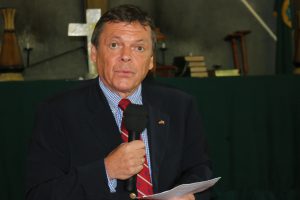MONROVIA – Hubert Jäger, the German Ambassador to Liberia, joined the chorus of international community calling on Liberia to hold a war crimes court.
This story first appeared on FrontPageAfricaOnline as part of a collaboration for the West Africa Justice Reporting Project.

German Ambassador Hubert Jäger
Speaking at the launch of the Alliance for Transitional Justice, a collaboration of human rights, faith-based and survivors groups to push for the court at the Lutheran Church in Monrovia on Monday, Ambassador Jäger said that justice for Liberia’s war victims would be critical to Liberia’s quest to move forward.
“Providing justice for the victims of the conflict is a key aspect,” Ambassador Jäger said. “Creating the framework for a conducive environment that future generations don’t have that experience that their parents went through is another… indispensable part of the equation,” he added. “[An] Indispensible starting point will appear to be starting from the truth of what happened.”
Germany is no stranger to war crimes trials. In the aftermath of WW2 and the systemic murder of 6 million Jews and other minority groups by the Nazis that has come to be known as the Holocaust, Germany set out to prosecute the key perpetrators. Twenty-four former Nazi officials and six German organizations were tried in the historic Nuremburg Trials, which began right after the end of the war in 1945. (Nazi leader Adolf Hitler had committed suicide as Allied forces closed in on his Berlin bunker.) The European country is still prosecuting some of its citizens for war crimes. Last month they extradited a 94-year-old former guard of a concentration camp who had been hiding out in Queens, New York City.
Ambassador Jager said a court will be uncomfortable for many people but Germans have learned it is essential to moving forward.
“Coming to terms with the dark chapters of one’s national history—I can tell you also as a German—can be a very painful experience,” Ambassador Jäger cautioned. “There is neither a quick fix nor a blueprint for the best way forward. Each situation, in my opinion, is different,” he added, calling on politicians to own the process in order to make it sustainable.
The German economic story bears that out. After devastating defeats in two consecutive wars in the early 20th century the country has gone on to become the world’s fourth largest economy.
An estimated 250,000 people died during Liberia’s civil war (1989-2003). No one has faced justice over their killing inside Liberia.
The views of Liberians are mixed over the establishment of a war crimes court. Liberia is yet to establish the court nearly 10 years after the Truth and Reconciliation Commission (TRC) recommended it.
However, recently the pressure has been pilling up on the country both locally and internationally to establish the court. In May citizens petitioned the Liberian Legislature to create the court. In July the United Nations Human Rights Council urged for a full implementation of the TRC report. And earlier this month, the United States Congress passed a resolution to support the court.
Ambassador Jäger foreshadowed the many hurdles that would have to be overcome for a court to happen but said it was worth finding a way.
“How to best deal with the aftermath of the civil war and how to best factor a post conflict situation always comes with a plethora of challenges…” he said. “Charting the best way ahead is always a multifaceted and Herculean task often instilling numerous dilemmas,” he concluded, expressing optimism that the group was indicative of a healthy debate on war justice.
The Alliance for Transitional Justice, which held a memorial for an estimated 600 people who were killed during the St. Peter’s Lutheran Church Massacre, will advocate for a Liberian war crimes court, reparations for victims and a national memorial, its organizers say.
It comprises the Lutheran Church in Liberia (LCL) and Liberia Annual Conference of the United Methodist Church (LAC/UMC) whose edifices hosted displaced civilians throughout the civil war.
“We must ensure that this government timely passes the bill to establish a war and economic crimes court in Liberia,” said Jeremiah Swen, the group’s National Chairperson. “This is not politics. This is the restoration of our dignity, the healing, reconciling and prosperity of our people and nation – a pathway to secure our Constitution,” he added.
